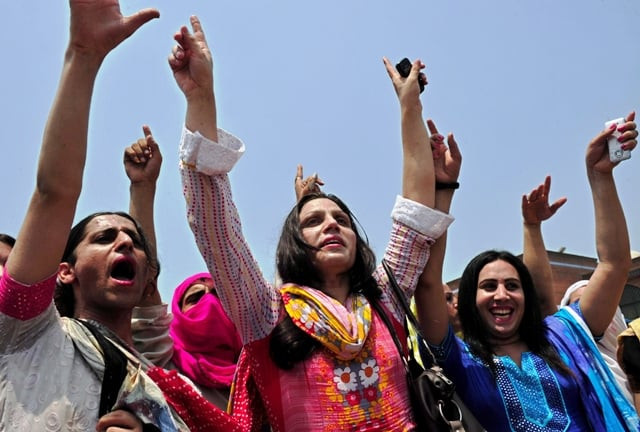Transgender and proud
Activist-author Laxmi Narayan Tripathi’s discussion with Shayma Saiyid.

File photo of transgenders. PHOTO: AFP/ FILE
Arguably the strongest session of the first day was a discussion with a person who has experienced first-hand the hate that mankind can have towards its own, nominally different members.
It would not be wrong to say that Laxmi Narayan Tripathi served as a very strong and positive image changer for transgender people in South Asia. Narrating her experiences in firm, yet polite manner, laced with biting yet hilarious sarcasm, the transgender author and activist’s talk showed exactly why “Me Hijra, Me Laxmi” has received positive reviews.
“I have written everything quiet bluntly in my book,” Tripathi said. And just as bluntly, she shared how, because of her femininity, she was sexually abused when she was only six-years-old.
Tripathi went on to explain how, as she grew up, her feminine side became more and more obvious, eventually reaching the point where people around her would say, “[Her femininity] is like a bottled drink, shake it and it will come fizzing out.”

Tripathi also narrated how her parents loved her, regardless of her being a transgender, which made for a rare case as she was not kicked out of her house, which is the fate of countless transgender people who ‘come out’ to their families.
“I’m from a Brahmin family, and initially other family members did try to oppose me by saying, ‘In 14 generations of our family, no hijra was born, so how can Laxmi be a hijra?”
Speaking of her religious leanings, Tripathi revealed one interesting detail — that transgender people in both India and Pakistan refer to themselves as Sufis.
“I left my religion, my cast, my everything when I left home to be with my guru,” Tripathi said.
Born and raised in an affluent family, Tripathi said, “I have gotten educated at the best institutes, but I don’t mind getting rid of all the ‘sophistication’ that comes from my class when I need to get something done by the police or other authorities for my people”.
Speaking of the stigmas and struggles associated with being transgender, Tripathi was of the view that our respective governments and laws have come a long way, “but it is people like you and I who will have to change the way everyone looks at us and treats us”.
To a question on HIV/AIDS, she responded, “HIV is society’s stigma not ours, the [general public] has made it impossible for a transgender to live without going into the petty profession of prostitution.”
Published in The Express Tribune, April 25th, 2015.



















COMMENTS
Comments are moderated and generally will be posted if they are on-topic and not abusive.
For more information, please see our Comments FAQ